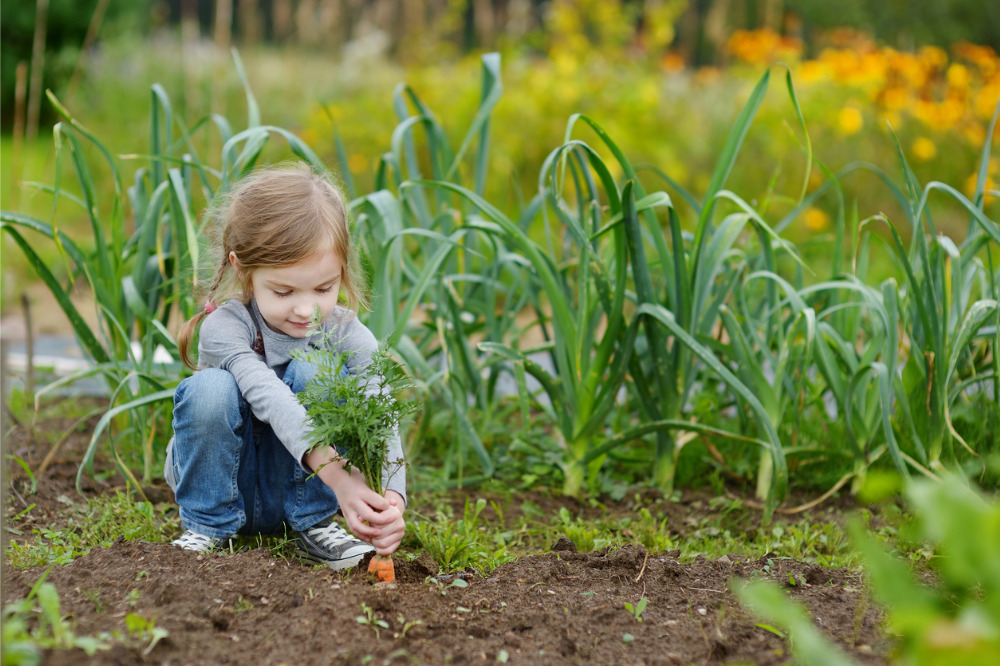
by Gabrielle Edwards
News about the climate crisis alerts us to the urgent need for drastic global changes. Given this, it’s not surprising that one study surveying thousands of young people found most respondents were worried about climate change, and over 45 per cent said worries about climate change affected them daily.
Young people are experiencing high levels of climate anxiety which is characterised by feelings of fear, worry, despair and guilt and can negatively affect psychosocial health and well-being.
Taking climate action is one proposed way to reduce climate anxiety by turning negative emotions in response to the reality of urgent challenges into positive action.
Engaging with food systems presents a major opportunity to act on the climate crisis, as they contribute 21 to 37 per cent of global greenhouse gas emissions. Both home-based discussions with parents or caregivers and school curriculums have a place in helping young people connect relationships with food to advocating for change to food systems or making more sustainable choices to benefit our shared planetary health.
What is a food system?
A food system includes everything that happens to food from farm to fork. The food system also includes all the people involved in each of those steps, including us.
Every time we eat, we participate in the food system. Yet, due in part to the increased number of steps between farm to fork, and the fact that in our dominant global economy food is positioned as a product to consume, there is a growing disconnect between people and the food system.
This disconnect has both contributed to current issues caused by food systems, and continues to perpetuate them. These issues include biodiversity loss, ecosystem degradation and global inequalities related to both labour practices and resource extraction.
Impact of daily choices
Many of us rarely consider the impact our daily food choices have on the environment. Those that do seldom see our own potential in engaging with and transforming the food system beyond eating on the basis of conscience.
Recognising our role in the food system can be empowering, as it presents opportunities to act on the climate crisis.
Primary and secondary schools are a logical place to engage students in these issues as they are locations where young people spend most of their day and institutions that have goals of promoting an educated and engaged citizenry.
Despite the potential of educational institutions to engage young people in issues related to food systems, many school curriculums around the world, including throughout Canada, fail to do this.
Beyond nutrition, cooking
For example, research about primary school curriculums in 11 countries including Australia, England, Japan, Norway and Sweden finds that curriculums tend to focus on nutrition education or cooking skills with little to no mention of the ways current food systems are destroying our environment or perpetuating gross social injustices. Research about Canadian curriculums has similarly found curriculum policies tend to focus on eating in healthy ways as a matter of individual choice.
Although much curriculum does not take a holistic approach to food systems education, there are many third-party organisations that have created resources for educators examining food systems in a more comprehensive way.
Nutrition and cooking are important for individual health. But this limited focus can be disempowering for young people as it does not consider the positive impact people can have on transforming food systems to be more just and environmentally sustainable.
By showing the next generation ways to change our food systems for the better, we can not only reduce climate anxiety, but also ensure the next generation is equipped with the knowledge and skills to create a more just and sustainable future.
Taking action locally
So how do we support these important issues in our schools? If you are a concerned parent, you could join the parent advisory committee at your child’s school or write to your school district to find out if there are any positive local initiatives and to express concern.
You could also write to your provincial or territorial legislative representative to advocate for the inclusion of these issues in the curriculum.
Outside of school, parents or caregivers could find ways to engage children in discussions around food systems that go beyond nutrition. For school projects where a child has a choice about the topic, or as a home project, encourage your child to research different organisations in your area that are involved in sustainable food systems work. Together, visit a local farm or starting a small indoor or outdoor garden.
How a meal arrives on a plate
Another activity to start thinking about the global impact of food systems is to explore how a meal comes to be on your plate. You could ask questions like:
- What are the ingredients?
- Where in the world did all those ingredients originate?
- Who was involved in growing the ingredients, in transporting them and in creating the food being consumed?
- Were all those people treated fairly?
- Was the environment harmed in the production of the food?
Analysing even a simple meal can lead to complex thoughts and discussions around food systems and reveal stark social and environmental issues.
By looking beyond nutrition, food can become a powerful tool to empower young people to take climate action which, in turn, can lead to reduced climate anxiety and increased feelings of hope for the future.
This article originally appeared in The Conversation and was written by Gabrielle Edwards, PhD Candidate in Curriculum Studies at the University of British Columbia.


